Glaciers, to
repeat again, are melting now. These massive volumes of fresh water are pouring into the oceans like there's no tomorrow. This leads to certain oceanic changes -- less salty, cooler, and higher sea levels. But these three quantitative changes are not the whole story. They will in turn also affect the global climate significantly, especially around the Atlantic as this melting leads to large scale changes in the ocean currents that redistribute heat and moisture between the southern and northern hemispheres.
Thus our global climate system is scheduled to enter a period of chaotic change, not in some far off future, and not only in your lifetime. It has already been underway. Consider this week's report:
"After 40 years of stability, the Kangerdlugssuaq Glacier in southeastern Greenland has become one of the world's fastest-melting glaciers, says glaciologist Gordon Hamilton from the University of Maine.
Hamilton took the first-ever direct measurements on the surface of Kangerdlugssuaq Glacier Jul. 18 and discovered it is now moving at an unglacial 38 metres per day, or 14 kilometres per year. That is nearly three times faster than it was in 2002 when a NASA plane flew over to take measurements.
'We were just floored by the change in speed,' Hamilton told IPS from on board the Greenpeace ship Arctic Sunrise off the coast of Greenland.
The Kangerdlugssuaq Glacier had also unexpectedly retreated five kilometres since 2002 after maintaining a stable position for the past 40 years.
No one has observed anything like these changes before, he said."
{story continues at link above}
~~~ ~~~ ~~~
See also: "The Day Before Tomorrow" at
http://heroux.blogspot.com/2005/05/day-before-tomorrow-in-ireland.htmland "Crazy Weather for Busy Folks" at
http://heroux.blogspot.com/2005/02/giat-briefing-on-crazy-weather-for.html
THEY JUST NEVER MEANT VERY MUCH TO USBy David Edwards
Samples From An Ocean Of SufferingIn 1992 a group of neuroscientists travelled to India to research the effects of meditation. In the mountains above Dharamsala, the scientists spent time with a young monk who had been meditating intensively for six years. Richard Davidson, a psychobiologist from the University of Wisconsin, had done pioneering work correlating minute shifts in facial expression with emotions. He explained to the monk that he would be shown a video of Tibetan demonstrators being beaten by Chinese security forces. His face would simultaneously be videoed to record any reactions. Writer Alan Wallace described the result:
"As the monk watched the video, we didn't detect any change of expression in his face at all, no grimace, no shudder, no expression of sadness." (Wallace,
Buddhism With An Attitude, Snow Lion Publications, 2001, p.176)
The monk was asked to describe his experience while watching the video. He replied:
"I didn't see anything that I didn't already know goes on all the time, not only in Tibet but throughout the world. I am aware of this constantly."
It was not that the monk failed to experience compassion while watching these brutal scenes, Wallace explains: "He was aware that he was simply being shown a video - patterns of light - representing events that took place long ago. But this suffering was simply one episode in the overall suffering of samsara [existence], of which he was constantly aware. Hence, while looking out over the ocean of suffering, he didn't feel anything extraordinary when he was shown a picture of a glass of water". (Email to author, July 15, 2005)
This account came to mind when I saw the response to the July 7 terrorist atrocities in London. In the video experiment, the monk's mind was so steeped in compassion that his expression did not change at all even when he saw images of his own people being brutalised. So what does it tell us that so many British people were so deeply shaken by the suffering of their fellow citizens?
After all, have we not been reading and watching endless accounts and footage of near-identical horrors in Iraq and Palestine on mainstream and internet-based media over the last few years? The suffering of the Iraqi people, for example, is almost beyond belief. When the West again blitzed Baghdad in March 2003, this followed years of war and sanctions that had shattered the country's infrastructure. The population again being bombed had already had to endure the deaths of literally hundreds of thousands of children from malnutrition, water-borne diseases and other horrors caused by US-UK sanctions. This truly was suffering heaped on suffering.
Howard Zinn made the point after the September 11 attacks:
"One of the things that occurred to me, after I had gotten over my initial reaction of shock and horror at what had been done, was that other scenes of horror have taken place in other parts of the world and they just never meant very much to us." (Zinn,
Terror And War, Open Media Book, 2002, p.90)
~~~ ~~~ ~~~
...article continues over at MediaLens, link above ...
Disingenuous Readers
"You can't wake a person who is pretending to be asleep."
-- a Navajo saying
You Are the Wrench Monkey

Info-Labour and Precarisation
by
Franco Berardi
"We have no future because our present is too volatile. The only possibility that remains is the management of risk. The spinning top of the scenarios of the present moment."
--William Gibson, Pattern Recognition
In February 2003, the American journalist Bob Herbert published in the
New York Times the results of a cognitive survey on a sample of hundreds of unemployed youths in Chicago: none of their interviewees expected to find work the next few years, none of them expected to be able to rebel, or to set off large scale collective change. The general sense of the interviews was a sentiment of profound impotence. The perception of decline did not seem focused on politics, but on a deeper cause, the scenario of a social and psychical involution that seems to cancel every possibility of building alternatives.
The fragmentation of the present time is reversed in the implosion of the future.
{continues here:
http://www.generation-online.org/t/tinfolabour.htm
This story is illustrated with shocking photos. The shock, I hope, should be experienced by U.S. Christian fundamentalists who want the government to punish homosexuals. Please look at the photos and realize that
you are the man with one eyebrow.
Iran's theocrats execute two boys in Edalat Square
Subcomandante Marcos

Marcos is gay in San Francisco, black in South Africa, an Asian in Europe, a Chicano in San Ysidro, an anarchist in Spain, a Palestinian in Israel, a Mayan Indian in the streets of San Cristobal, a gang member in Neza, a rocker in the National University, a Jew in Germany, an ombudsman in the Defense Ministry, a communist in the post-Cold War era, an artist without gallery or portfolio.... A pacifist in Bosnia, a housewife alone on Saturday night in any neighborhood in any city in Mexico, a striker in the CTM, a reporter writing filler stories for the back pages, a single woman on the subway at 10 pm, a peasant without land, an unemployed worker... an unhappy student, a dissident amid free market economics, a writer without books or readers, and, of course, a Zapatista in the mountains of southeast Mexico. So Marcos is a human being, any human being, in this world. Marcos is all the exploited, marginalized and oppressed minorities, resisting and saying, 'Enough'!
--Subcomandante Marcos of the Zapatistas

This goes out to all the xenophobic caucasoid steroid-abusing semi-literates out there. Hey do me a favor, try not to hurt anybody, OK?
Back in June, Chinese farmers in Shengyou village of Hebei province were attacked by a private militia of corporate goons, like a scene right out of a John Steinbeck novel about events during the American Depression years. Some 300 hired men armed with clubs and rifles descended upon the village protest and fought a fierce battle with the farmers, six of whom were killed. At issue was their land: a power plant wanted the farmland for its ash storage, and conflict over land rights had been escalating for about a year.
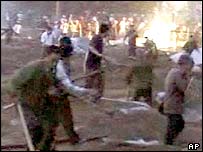
In today's update, those farmers have won a dispute over land rights.
The June clashes, in which six people died, were filmed by a local and given widespread publicity abroad. To see the footage, follow this link to
video http://news.bbc.co.uk/2/hi/asia-pacific/4702339.stm
Follow the Leader?
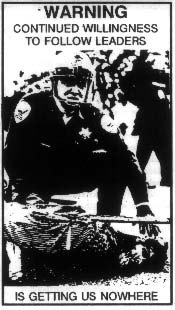
Cheney II

"We have to make America the best place in the world to do business."
--Vice President Dick Cheney
Dophins Say Bye-bye.

Dolphins around the world suddenly left. Zoologists report that that their final communication could be translated as:

"Goodbye, and thanks for all the fish!"
{With apologies to Douglas Adams}
Back in April, our bloggence detected an historic innovation: angry mob riots for environmental justice in China. This is again to illustrate the point about our post-contemporary times. Welcome to your future; it just happened yesterday. And it just happened again this weekend. Another huge riot over a polluting factory.
Anger in China Rises over Threat to Environment {excerpts from the
New York Times}

Protesters, who say the pharmaceuticals factory at Xinchang pollutes their water, were blocked on Monday by police barricades.
Xinchang, China - After
three nights of increasingly heavy rioting, the police were taking no chances on Monday, deploying dozens of busloads of officers before dusk and blocking every road leading to the factory.
But the angry residents in this village 180 miles south of Shanghai had learned their lessons, too, they said, having studied reports of riots in towns near and far that have swept rural China in recent months. Sneaking over mountain paths and wading through rice paddies, they made their way to a pharmaceuticals plant, they said, determined to pursue a showdown over the environmental threat they say it poses.
As many as
15,000 people massed here Sunday night and waged a pitched battle with the authorities, overturning police cars and throwing stones for hours, undeterred by thick clouds of tear gas. Fewer people may have turned out Monday evening under rainy skies, but residents of this factory town in the wealthy Zhejiang Province vow they will keep demonstrating until they have forced the 10-year-old plant to relocate.
"This is the only way to solve problems like ours," said a 22-year-old villager whose house sits less than 100 yards from the smashed gates of the factory, where the police were massed. "If you go to see the mayor or some city official, they just take your money and do nothing."
The riots in Xinchang are a part of a rising tide of discontent in China, with the number of mass protests like these skyrocketing to
74,000 incidents last year from about 10,000 a decade earlier, according to government figures.
In Xinchang, however, residents say new technology, like the cellphone, has played little part. Instead, many residents say they were moved to action after years of unhappiness about industrial pollution by copies of newspaper headlines from Dongyang. That city, a mere 50 miles away, was the scene this spring of one of China's biggest riots, in which more than 10,000 residents routed the police in a riot over pollution from a pesticide factory.
Despite tight controls on news coverage of the incident, the riot in Dongyang, where the chemical factory remains closed months later, has firmly entered Chinese folklore as proof that determined citizens acting en masse can force the authorities to reverse course and address their needs.
"As for the Dongyang riot, everyone knows about it," a man in his 20's exulted. "Six policemen were killed, and the chief had the tendons in his arms and legs severed. Perhaps they went too far, but we must be treated as human beings."
~~~ ~~~ ~~~
See previous bloggence on this topic:
Environmental Justice Mobs in China
Tourists Admire Village Rebellion
Violent Protest against pollution in China
Shake the Superflux
King Lear:Poor naked wretches, whereso'er you are,
That bide the pelting of this pitiless storm,
How shall your houseless heads and unfed sides,
Your loop'd and window'd raggedness, defend you
From seasons such as these? O, I have ta'en
Too little care of this! Take physic, pomp;
Expose thyself to feel what wretches feel,
That thou mayst shake the superflux to them,
And show the heavens more just.
--Shakespeare
Today as Hurricane Emily scours the Caribbean Sea & Mexico, another one on the other side of the earth, Typhoon Haitang, is making life more interesting in Taiwan:
"With maximum sustained winds of 198 km/h (123 mph) and gusts of up to 245 km/h (152 mph), Haitang is a dangerous Category 5 storm, the maximum on the five-step scale."
News puts this typhoon in the same category as one that killed 200 people back in 2001. We're waiting around to see who're the unlucky ones.... If I don't blog for the next few days, then it was probably me.
Here's a photo of a typhoon a few years ago:

Millennia of Green Anarchy

Eco-anarchism or social ecology or green communalism or so forth has a long, long history -- millennia not years.
"Of the 287 chemicals detected in umbilical-cord blood, we know that 180 cause cancer in humans or animals, 217 are toxic to the brain and nervous system, and 208 cause birth defects or abnormal development in animal tests." --according to a new study by the Environmental Working Group.
Meanwhile, "the Government Accountability Office issued a report on Wednesday saying the Environmental Protection Agency does not have the powers it needs to fully regulate toxic chemicals."
Study Finds Unborn babies carry pollutants
The Logic of Suicide Terrorism:
It's the Occupation, Not the Fundamentalism By Scott McConnell
The American Conservative In June,
The American Conservative magazine interviewed Associate Professor Robert Pape of the University of Chicago, whose book on suicide terrorism,
Dying to Win, is beginning to receive wide notice. Pape has found that the most common American perceptions about who the terrorists are and what motivates them are wrong. In his office is the world's largest database of information about suicide terrorists, rows and rows of manila folders containing articles and biographical snippets in dozens of languages compiled by Pape and teams of graduate students, a trove of data that has been sorted and analyzed and which underscores the great need for reappraising the Bush administration's current strategy. . . .
~~~ ~~~ ~~~
Prof Pape's conclusion:
"The central motive for anti-American terrorism, suicide terrorism, and catastrophic terrorism is response to foreign occupation, the presence of our troops. The longer our forces stay on the ground in the Arabian Peninsula, the greater the risk of the next 9/11, whether that is a suicide attack, a nuclear attack, or a biological attack."
Stiff Upper Lip
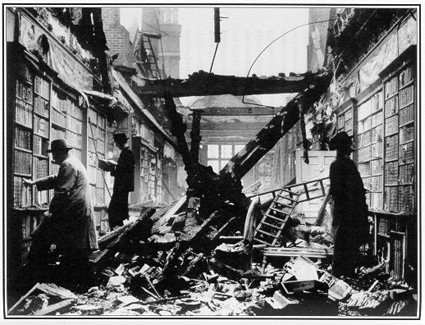
Bookshop in London bombed during WWII by Nazi V2 rockets.
Note stiff upper lip on the readers.
The Pleasures of Existence
"A description of
The Rural Life of England, which Howitt published in 1840, exhibited a no doubt excessively generalized satisfaction in concluding that every man who has a feeling for the pleasures of existence should thank Heaven for having let him live in such a country at such a time. But, on the contrary, our era dares not render too emphatically, with regard to the life that is lived now, the general disgust and the beginnings of terror that are felt in so many areas. They are felt, but never expressed before bloody revolts. The reasons for this are simple. The pleasures of existence have recently been redefined in an authoritarian way — first in their priorities, and then in their entire substance. And these authorities who redefined them could just as well decide at any moment, without having to burden themselves with any other consideration, which modification could be most lucratively introduced into the techniques of their manufacture, completely liberated from the need to please. For the first time, the same people are the masters of everything that is done and of everything that is said about it. And so Madness “hath builded her house . . . on the highest places of the city.”
-- Guy Debord
Panegyric
Anarchist Argentina Today
Anarchist Argentina After 2001(excerpt below is from the
Wikipedia article on historical examples of anarchist communities.
Wikipedia is at http://en.wikipedia.org/wiki/Main_Page )
After the non-violent collapse of the Argentinean government in 2001/2002, the social and economic organization of Argentina has undergone major changes, though how important these changes are remains to be seen. Argentina was once a shining example of a country undergoing free market reforms, and structural adjustment programs. However, after the economy crashed in 2001, the IMF responded by demanding that more social programs (health care, schools, etc) be cut, and more things be privatized. Massive popular rebellion erupted.
Out of the uprisings, came many popular organs of self-management and direct democracy. Worker occupations of factories and popular assemblies have both been seen functioning in Argentina, and both are the kind of action endorsed by anarchists: the first is a case of direct action and the latter a case of direct democracy. Approximately 200 "recovered" factories (
fábricas recuperadas) are now self-managed and collectively owned by workers.
Over 10,000 people are working in factories with little or no management or hierarchy. In the large majority of them, pay is completely egalitarian; generally no professional managers are employed, or managers are collectively controlled in the other cases. Decisions are made by all workers, in general assembly type structures. These co-operatives have organised themselves into networks. Solidarity and support from external groups, such as neighborhood assemblies and unemployed (
piquetero) groups, have often been important for the survival of these factories. Unemployed workers elsewhere have also organized takeovers of plots of vacant land, and taken them back for housing and growing food. Similar developments have taken place in Brazil and Uruguay.
In a survey by an Argentina newspaper in the capital, it was found that around
1/3 of the population had participated in general assemblies. The assemblies take place in street corners and public spaces, and generally gather to discuss ways of helping each other in the face of eviction, or organizing around issues like health care, collective food buying, or conducting free food distribution programs. Some assemblies have started to create new structures of health care and schooling, to replace the old ones that aren't working. Neighborhood assemblies meet once a week in a large assembly to discuss issues affecting the larger community.
[1]
http://www.americaspolicy.org/citizen-action/series/12-factories.html In 2004, Avi Lewis and Naomi Klein (author of
No Logo) released the documentary
The Take (http://www.nfb.ca/thetake/), which is about these events.
Commoner's Laws
Everything is connected to everything else.
Everything must go somewhere.
Nature knows best.
There's no such thing as a free lunch.
--Barry Commoner’s informal laws of ecology
Blair's Bombs
by John Pilger
In all the coverage of last week's bombing of London, a basic truth is struggling to be heard. It is this: no one doubts the atrocious inhumanity of those who planted the bombs, but no one should also doubt that this has been coming since the day Tony Blair joined George Bush in their bloody invasion and occupation of Iraq. They are "Blair's bombs", and he ought not be allowed to evade culpability with yet another unctuous speech about
"our way of life", which his own rapacious violence in other countries has despoiled.
Indeed, the only reliable warning from British intelligence in the run-up to the invasion of Iraq was that which predicted a sharp increase in terrorism "with Britain and Britons a target". A House of Commons committee has since verified this warning. Had Blair heeded it instead of conspiring to deceive the nation that Iraq offered a threat the Londoners who died on Thursday might be alive today, along with tens of thousands of innocent Iraqis.
Three weeks ago, a classified CIA report revealed that the Anglo-American invasion of Iraq had turned that country into a focal point of terrorism. None of the intelligence agencies regarded Iraq as such a flashpoint before the invasion, however tyrannical the regime. On the contrary, in 2003, the CIA reported that Iraq "exported no terrorist threat to his neighbours" and that Saddam Hussein was "implacably hostile to Al-Qaeda".
Blair's and Bush's invasion changed all that. In invading a stricken and defenceless country at the heart of the Islamic and Arab world, their adventure became
self-fulfilling; Blair's epic irresponsibility has brought the daily horrors of Iraq home to Britain. . . ."
~~~ ~~~ ~~~
{continues at http://www.truthout.org/docs_2005/071005X.shtml }
~~~ ~~~ ~~~
The Reality of This Barbaric Bombing
By Robert Fisk
"If you bomb our cities," Osama bin Laden said in one of his recent video tapes, "we will bomb yours." There you go, as they say. It was crystal clear Britain would be a target ever since Tony Blair decided to join George Bush's "war on terror" and his invasion of Iraq. We had, as they say, been warned. The G8 summit was obviously chosen, well in advance, as Attack Day.
And it's no use Mr Blair telling us yesterday that "they will never succeed in destroying what we hold dear". "They" are not trying to destroy "what we hold dear". They are trying to get public opinion to force Blair to withdraw from Iraq, from his alliance with the United States, and from his adherence to Bush's policies in the Middle East. The Spanish paid the price for their support for Bush - and Spain's subsequent retreat from Iraq proved that the Madrid bombings achieved their objectives - while the Australians were made to suffer in Bali.
It is easy for Tony Blair to call yesterdays bombings "barbaric" - of course they were - but what were the civilian deaths of the Anglo-American invasion of Iraq in 2003, the children torn apart by cluster bombs, the countless innocent Iraqis gunned down at American military checkpoints? When they die, it is "collateral damage"; when "we" die, it is "barbaric terrorism".
If we are fighting insurgency in Iraq, what makes us believe insurgency won't come to us? One thing is certain: if Tony Blair really believes that by "fighting terrorism" in Iraq we could more efficiently protect Britain - fight them there rather than let them come here, as Bush constantly says - this argument is no longer valid. . . ."
{continues at http://www.truthout.org/docs_2005/070905Z.shtml }
~~~ ~~~ ~~~
Pilger & Fisk agree on the main idea here. If you've been paying attention to actual events over the past 2 years, it's easy to see why. Actually these pieces almost write themselves. Yet despite such obviousness, the propaganda continues to spin away successfully with simplistic images about good versus evil, about multi-faith cosmopolitanism, about innocent civilians
only mattering on one side of the war, but not the other, etc. None of that applies to the actuality of the events. But how many TV news reports quote from Blair's lies and misdirections rather than from the hundreds of Pilgers & Fisks of the world?
Please Don't Go Back to Sleep
by Eve Ensler
Dear America: I am longing to reach you -- crossing this river of indifference and consumption and denial. I am trying to find you, reaching out through the desperate limitations of words and descriptions, swimming through the rhetoric of terror and God.
. . . [excerpted] . . .
America, there is not much time left. The fire is spreading, consuming the world. We are the arsonists. We will need each other to find our way out through the lies and haze. It will take our greatest imagination, courage and skill to subdue these flames.
Eve Please Don't Go Back to Sleep
“The War on Terror” and the Message of Carnage
by Norman Solomon
When the French government suggested a diplomatic initiative that might interfere with the White House agenda for war, the president responded by saying that the proposed scenario would "ratify terror." The date was July 24, 1964, the president was Lyndon Johnson and the war was in Vietnam.
Four decades later, the anti-terror rationale is not just another argument for revving up the U.S. war machinery. Fighting "terror" is now the central rationale for war.
"The contrast couldn't be clearer between the intentions and the hearts of those who care deeply about human rights and human liberty, and those who kill, those who've got such evil in their hearts that they will take the lives of innocent folks," President Bush said Thursday after the London bombings." The war on terror goes on.
A key requirement of this righteous war is that all inconvenient history must be deemed irrelevant. "By accepting the facile cliche that the battle under way against terrorism is a battle against evil, by easily branding those who fight us as the barbarians, we, like them, refuse to acknowledge our own culpability," journalist Chris Hedges has observed. "We ignore real injustices that have led many of those arrayed against us to their rage and despair."
In the aftermath of 9/11, writer Joan Didion critiqued "the wearying enthusiasm for excoriating anyone who suggested that it could be useful to bring at least a minimal degree of historical reference to bear on the event." Overwhelmingly, politicians and pundits were quick to get in a groove of condemning any sensible assertions "that events have histories, political life has consequences, and the people who led this country and the people who wrote and spoke about the way this country was led were guilty of trying to infantilize its citizens if they continued to pretend otherwise."
Voices of reason, even when they've come from within the country's military establishment, have been shunted aside. In late November 2002, a retired U.S. Army general, William Odom, told C-SPAN viewers: "Terrorism is not an enemy. It cannot be defeated. It's a tactic. It's about as sensible to say we declare war on night attacks and expect we're going to win that war. We're not going to win the war on terrorism. And it does whip up fear. Acts of terror have never brought down liberal democracies. Acts of parliament have closed a few."
Two years after 9/11, Norman Mailer asked: "What does it profit us if we gain extreme security and lose our democracy? Not everyone in Iraq, after all, was getting their hands and/or their ears cut off by Saddam Hussein. In the middle of that society were hordes of Iraqis who had all the security they needed even if there was no freedom other than the full-fledged liberty offered by dictators to be free to speak with hyperbolic hosannas for the leader. So, yes, there are more important things to safeguard than security and one of them is to protect the much-beleaguered integrity of our democracy. The final question in these matters suggests itself. Can leaders who lie as a way of life protect any way of life?"
The president who lied his way into an invasion of Iraq is now exploiting Thursday's atrocities in London to justify U.S. policies that are bringing daily atrocities to Iraq. Bush is intent on sending a message to "the terrorists" by continuing the Pentagon's war effort.
The idea of communicating by killing is very familiar. There's nothing new about claiming to send a righteous message with bullets and bombs. . . .
{conclusion online at link above...}
U.S. & Britain led massive secret bombing campaign
Africa & Global Warming Cannot be Dealt With Separately"Two weeks ago, a group of British aid agencies and environmental groups, from Oxfam to Greenpeace, forcefully pointed out this awkward truth. Their report,
Africa - Up In Smoke? insisted the issues of African poverty and climate change are inseparably linked, and the first cannot be solved without dealing with the second. It was a direct challenge to the simple Live8 theme, that if only the economic basis of Africa's future can be sorted by a properly responsible rich world, the continent will come good. It will not, the report said, if we do not tackle the warming atmosphere. . . ."
See also:
Bush, the Obstacle to a Deal on Global Warming http://www.truthout.org/docs_2005/070505B.shtml
Chinese Addictions
1.
State-capitalist sponsored smoking: this is an addiction that the government of China has found to be profitable for its state-owned cigarette company.
"Chinese men smoke cigarettes at twice the rate U.S. men do, according to a June dispatch from Guiyang by Toronto's
Globe and Mail, and that includes an estimated 60 percent of male Chinese doctors, with about 90 percent of the men believing that smoking is either not harmful or actually healthful. Implicated in these beliefs is the government, whose cigarette monopoly sells 1.8 trillion units a year (at the equivalent of about 25 cents (U.S.) a pack) and apparently disseminates its own feel-good messages about smoking (e.g., that it enhances brain function, relieves schizophrenia, reduces the risk of Parkinson's disease), despite also requiring small health warnings on the package."
From Chuck Shephard's "News of the Weird" at
http://www.newsoftheweird.com/archive/index.html 2. Internet addiction, especially among adolescent males in China is now a recognized social problem.
"
Chinese struggle to handle growing Internet addictionOFFLINE: A government-owned clinic that opened in Beijing in March has two dozen nurses and doctors to care for its patients, who are mostly young men . . ."
http://www.taipeitimes.com/News/world/archives/2005/07/03/2003262008/print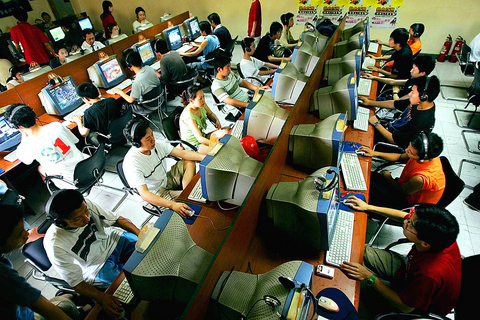
Anarchists have remained almost invisible in mass media films. Worse, when they have appeared, it is generally some bourgeois stereotype of anarchists as violent or some socialist stereotype of anarchists as infantile.
British director
Ken Loach made a film that finally attempts an anarchist's view of anarchists in Spain during the civil war against the fascists. The victors write history, so as losers of that war, their history has for too long remained untold. But this 1995 film,
Land & Freedom shows what they were fighting for and what they were fighting against. One of the best aspects here is that the film also shows how the communists aggressively destroyed the anarchists more than their supposed common enemy. This I take as a lesson for today's left.
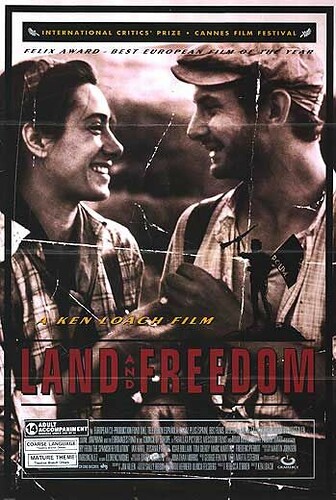
The melancholy hopelessness of our own 21st century is a consequence of that tragic defeat by the fascists -- largely because the Left fragmented and was brutally dominated by Leninist dictators.
Torture Fatigue
By Silja J.A. Talvi
"The Christian in me says it's wrong," Army Specialist Charles A. Graner Jr. said of torturing prisoners in Abu Ghraib prison in Iraq. "But the corrections officer in me says I love to make a grown man piss himself."
Photos taken of him demeaning captives at Abu Ghraib exposed Graner as the sadist that his surroundings allowed him to be. But are the differences between brutal correctional officers like Graner and other Americans as stark as we would like to think?
[essay then discusses how movie-goers love the new
Sin City because of its gory scenes of torture and sadism. Audiences find it enjoyable and without consequences.]
"Real healing and emotional catharsis would actually require genuine discomfort, discourse and reparation. It would necessitate an admission of our collective culpability for the emotional and physical damage inflicted by our government, whether on the streets of Baghdad, or in the interrogation rooms of Abu Ghraib and Guantánamo Bay." [quoting a psychologist]
Without such reflection, we're headed for our own true-to-life
Sin City, a veritable carnival of bloodsport, torture and misery for all. . . .
~~~ ~~~ ~~~
This is, in other words, a pop psychology version of what Susan Sontag pointed out last year in a more critical idiom. See my blog from February on her
"Regarding the Torture of Others" and the American version of
acceptable brutality in pop culture.
http://heroux.blogspot.com/2005/02/sontag-on-acceptable-brutality.html

 Marcos is gay in San Francisco, black in South Africa, an Asian in Europe, a Chicano in San Ysidro, an anarchist in Spain, a Palestinian in Israel, a Mayan Indian in the streets of San Cristobal, a gang member in Neza, a rocker in the National University, a Jew in Germany, an ombudsman in the Defense Ministry, a communist in the post-Cold War era, an artist without gallery or portfolio.... A pacifist in Bosnia, a housewife alone on Saturday night in any neighborhood in any city in Mexico, a striker in the CTM, a reporter writing filler stories for the back pages, a single woman on the subway at 10 pm, a peasant without land, an unemployed worker... an unhappy student, a dissident amid free market economics, a writer without books or readers, and, of course, a Zapatista in the mountains of southeast Mexico. So Marcos is a human being, any human being, in this world. Marcos is all the exploited, marginalized and oppressed minorities, resisting and saying, 'Enough'!
Marcos is gay in San Francisco, black in South Africa, an Asian in Europe, a Chicano in San Ysidro, an anarchist in Spain, a Palestinian in Israel, a Mayan Indian in the streets of San Cristobal, a gang member in Neza, a rocker in the National University, a Jew in Germany, an ombudsman in the Defense Ministry, a communist in the post-Cold War era, an artist without gallery or portfolio.... A pacifist in Bosnia, a housewife alone on Saturday night in any neighborhood in any city in Mexico, a striker in the CTM, a reporter writing filler stories for the back pages, a single woman on the subway at 10 pm, a peasant without land, an unemployed worker... an unhappy student, a dissident amid free market economics, a writer without books or readers, and, of course, a Zapatista in the mountains of southeast Mexico. So Marcos is a human being, any human being, in this world. Marcos is all the exploited, marginalized and oppressed minorities, resisting and saying, 'Enough'!





 "Goodbye, and thanks for all the fish!"
"Goodbye, and thanks for all the fish!" Protesters, who say the pharmaceuticals factory at Xinchang pollutes their water, were blocked on Monday by police barricades.
Protesters, who say the pharmaceuticals factory at Xinchang pollutes their water, were blocked on Monday by police barricades.








